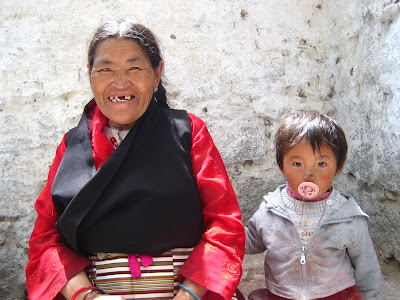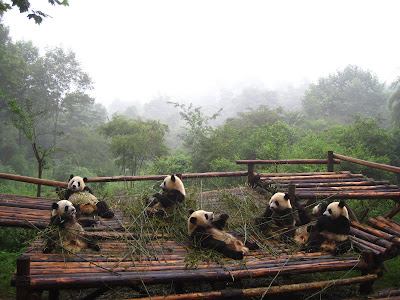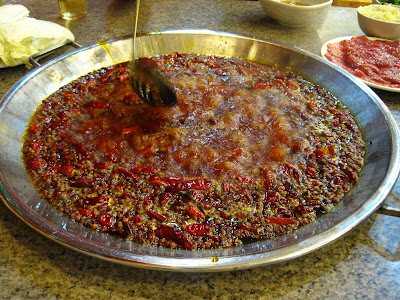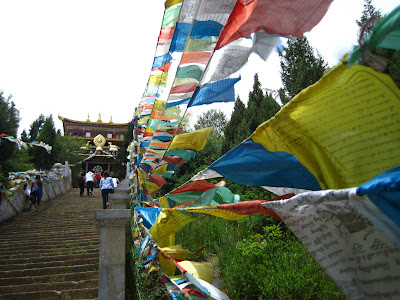At about 3500 meters up, Lhasa is one of the highest cities in the world. Now as I mentioned before, there are a number of things one notices about being that high in the troposphere. First of all, the sky is impossibly blue and impossibly bright. In fact, there's far less atmosphere blocking the sun's rays, so if you're not generous with the sunblock, your husk will cook! Secondly, the vegetation is sparse because not much can grow at that altitude. Whatever trees there are seem meticulously planted in an attempt to spruce the place up, but everything else resembles a Martian planetscape. This also means that any foods that grow on trees are out, so tubers and potatoes hold sway! Finally, and in reference to the title, altitude makes it really really hard to breathe! It's especially noticeable after climbing a flight of stairs, and every gasp to regain your breath is dreadfully insufficient!
So I was in Lhasa, Tibet, the very final stop on my crazy journey, and the reason I scrimped and saved all throughout other,
less stimulating locales. I absolutely wanted to go to Tibet. It seemed like it would be a crazy climax to a crazy journey, and the prospect of actually making it there would waver between likely and no-chance-in-hell. I did one credit card advance and even used the insurance money I got from my stolen ipod to keep the journey going on longer. Now that I was there and the bulk of it was already paid for, I could ride out the rest of my journey in satisfaction.
There were a few guides waiting outside the train station to pick up their designated foreigners. It was a stipulation to being in Tibet; a guide must get you from the train station and direct you to a hotel. Otherwise, who knows what kind of subversive havoc an errant tourist could wreak! Our guide found us quickly. His name was Jia Bu and he was an ethnic Tibetan as we had hoped. I say that because often enough, tour groups get a Han Chinese guide who spends the whole time spouting off propaganda about how Great China tamed the Tibetan savages etc etc etc. That would have been miserable. This guy seemed like a pretty docile chap. He loaded us all into a car where we met our prickly driver.
Everyone in the group was hair shy of being broke, so we strongly urged our guide to take us to the cheapest place he knew. What we got was a room at the Yak Hotel with four separate beds at a very reasonable price. It was about 3pm when we checked in, and thankfully our guide knew we all needed to unwind after the cloister that was the Qinghai-Tibet Railway, so he let us have the rest of the day to do as we pleased.
Walking around the streets of Lhasa was unlike anything else I had encountered in China. It didn't even seem like China. The people were different, the language was different, the writing was different, the clothing was different, the music was different. Honestly, it was unlike anything else I had seen on the trip thus far. And everything seemed like it was steeped in a layer of the divine. Pilgrims and monks walked the narrow streets with charms and other holy implements. Incenses which carried the palpable solemnity of an Old World rose up and seemed to occupy every house in every alley.
We were in the Barkhor, a district of streets and alleys which surrounded the Jokhang Temple, the most sacred and important temple in Tibet. Pilgrims moved in a wave, circling the temple in a clockwise manner. The more devout faced the temple and prostrated gravely after each step. Directly in front of entrance was a huge public square that was scorched under the bright sun. Barkhor Square. It was filled with tents of locals selling trinkets and souvenirs, but oddly enough, nothing about it seemed tacky or unbecoming. David suggested a game in which we would try and find the oldest, pruniest looking Tibetan possible. Each one kept topping the last.
We were hungry so we found a small wooden-benched hovel of a restaurant to grab some food in. I ate yak meat, rice, potatoes and carrots with gravy and yak butter tea; hands down the heartiest meal I had eaten since Canada.
The second day in Lhasa was spent touring its many holy sites. First off was the aforementioned Jokhang Temple in the center of the Barkhor. It was another sunny day and I made sure to layer on the sunscreen. Getting into the temple was easy. There were separate lines for tourists and pilgrims, the only difference being the fact that we had to pay. Oddly enough, the entry ticket was a credit card sized CD-ROM, a gimmick perhaps more suited to a science museum or an Expo pavilion rather than a hallowed Buddhist temple. Inside, I felt like a huge waste of space. There were hundreds of ornate statues of Buddha, all draped with the finest adornments, being worshiped in turn by throngs of pilgrims. Many brought thermoses of yak butter which they poured into the candles. Clearly this was a very big deal for them, and my gawking ass was just getting in their way. We couldn't take pictures either, which is understandable, so we just followed the queue and looked.
We trudged further around the Barkhor, this time with the guide who did a good job pointing out things we may have overlooked. I think he had a list of places that paid him to bring in tourists cause he kept leading us to these expensive restaurants that played up the whole "exotic Tibet" angle.
That evening all four of us went out for a drink. Finding a place to drink is never hard. Walk along alleys until you see a light on. Walk in the door and nine times out of ten it'll be a place that'll serve you. The local brew was Lhasa Beer. It was only 3% ABV, but the effect of the altitude probably carried it well above 5. We didn't know that so we got hammered almost every time.
Sleeping at high altitude is also something worth mentioning because it's really really hard! You literally have to remember to breathe sometimes, and it's not unheard of for people to flat out stop breathing while they sleep, only to wake up a little and sharply resume. My first night there, I couldn't sleep for a good 3 hours. By the second night I was doing better.
Day 3 in Lhasa brought us to the biggest baddest attraction in town: the Potala Palace. It was a former residence of the Dalai Lama (the real one) until all that shit went down and he had to leave. Now it's a massive towering compound in the center of the city that carries a strong significance for Tibetans and Chinese alike (it's on their money). It was also a lot of stairs which is probably why we waited until day 3 before tackling it. If we did this after getting off the train, we would have been useless wheezing masses. The whole place was like a maze following no kind of typical layout whatsoever. It was kind of interesting really. Some rooms served no purpose other than housing a really sacred Buddha (not uncommon in Tibet I would come to learn). A really nice old man gave us each some cool looking scarves. We exited out the other side and met with our guide.
The next attraction was the Norbulingka, the summer residence of the Dalai Lama (the Chinese one, not the real one). I have to say it was pretty boring. I mean, I have been seeing ornate palaces the entire trip and nothing about this one stood out. It was just a lot of walking, and with the thin air, that was a tough sell. Our guide chirped in with tidbits here and there. He remained surprisingly neutral on the whole China-Tibet issue, which is good I guess. Six days with some vitriolic dude would have probably worn me down.
That evening we found a sweet restaurant/bar filled with Chinese tourists. One guy was working the room with a guitar singing all kinds of Chinese ballads. When he got tired, the owner fired up a karaoke machine for more merriment. Being the only foreigners there, we garnered a bit of attention, which at no point was unwarranted. Lykke tried on some Chinese dress while I was taught a ridiculously complex drinking game involving cups, dice and betting.
The next day Jia Bu met us in the lobby as usual. He had a whole laundry list of things he wanted us to see and they were all temples. The first one we went to was so boring, I forgot the name entirely. I mean, it probably wasn't actually boring, but the problem starting with the Jokhang and the Potala Palace was that everything else that followed was kind of meh. The weather took a turn for the gloomy as well. And we may have been hungover, I don't remember, but either way the morning was kinda lousy.
So I guess he sensed we needed to see something new. I don't think we could've just run off for a whole day, so he opted to take us to the Sera Monastery. It was in the far north of town and edged up the side of a mountain. Inside, hundreds of monks in red robes meandered about. We had shown up just in time for a lively debating practice. Apparently this was what these guys did on the regular. I was told the subjects were pretty much philosophical, but when we showed up, they seemed to be practicing a technique where they would slap their hands together, lean forward and point in order to "drive the point home" I guess. Other tourists flanked the area and it got a bit claustrophobic after a while. We left at about suppertime.
That evening, Lyyke and Siri were determined to find a club. It didn't take much asking around, but eventually all four of us got into a cab and found ourselves outside of an extremely modern looking nightclub with a huddle of dressed up lads and girls in miniskirts in front. Being backpackers, we were woefully underdressed, but that didn't stop security from letting us jump the line and get in for free. The lighting inside was pretty intense, and the DJ played your typical David Guetta housey hiphop stuff while the masses crowded the dancefloor. The bulk of the crowd was Chinese with only a few Tibetans here and there. Drinks were pricey, but every so often, some random guy or girl would pull one of us aside, give us a beer, take a few pictures with us and their friends and that would be that. I played the really complicated cup dice betting game a few more times with a table of girls and lost horribly. They had probably about 30 to 40 bottles of beer in ice sitting on their table they seemed pretty intent on giving away. This beer was also of the non-Lhasa variety, so it kicked like a mule.
The night spun quickly out of control, what with the free drinks and all. We all split up and between the four of us, probably ended up at every table in the club. Honestly, the attention was out of hand. I felt a bit guilty being singled out and getting free drinks just cause I was white, but I just told myself it was the upside to all the gawking, pointing and nose-touching I endured all throughout Yunnan and Sichuan. Twice during the night, the music stopped and security circled the bar, as some fresh faced young Tibetan MC got up and did a song. The crowd went nuts each time it happened too cause apparently this guy was like the T.I. of Tibet or something.
So yeah, that was to be our last night in Lhasa before heading out on a 2-day roadtrip around rural Tibet. I have to say that the club was a pretty hilarious way to cap off the Lhasa experience. I guess we spent the entire time walking around the Old Town, so we never really got a chance to realize that Lhasa is a living, working city. Seeing the more modern side was kind of interesting. Like skiing in Iran or something. Anyways, we would be back to Lhasa for another day after the roadtrip, so it wasn't goodbye or anything.
At 4am, getting back to the hotel was a shambolic affair. The only thing I remember was Siri, with her chirpy Norwegian accent, begging me to go help her find a hamburger. It was hilarious and became a meme for the rest of the trip.
The energy of the Barkhor
Here's one of the many characteristic stalls you see lining the alleys of the Barkhor
Tibetan mother and child. Most Tibetans develop cataracts at a young age because of the sun.
David and Siri eating that hearty feast I was telling you about.
Bakhor Square. Note the sun!
Chinese police keeping a vigilant eye on everything at all times.
Lykke & cat
This childhood could beat up my childhood
David, Siri and I in the evening.
The entrance to the Jokhang Temple. Prostrating masses.
Rooftops of the Old Town.
Barkhor Square from on top the Jokhang Temple, day 2. Note the Potala Palace looming ominously in the background.
Potala Palace: Hope you like stairs!
Burning piles everywhere in Lhasa.
Conviction meets incredulity. Monks engaged in a lively debate at the Sera Monastery.
Grandmother and grandchild at the Sera Monastery.
























































